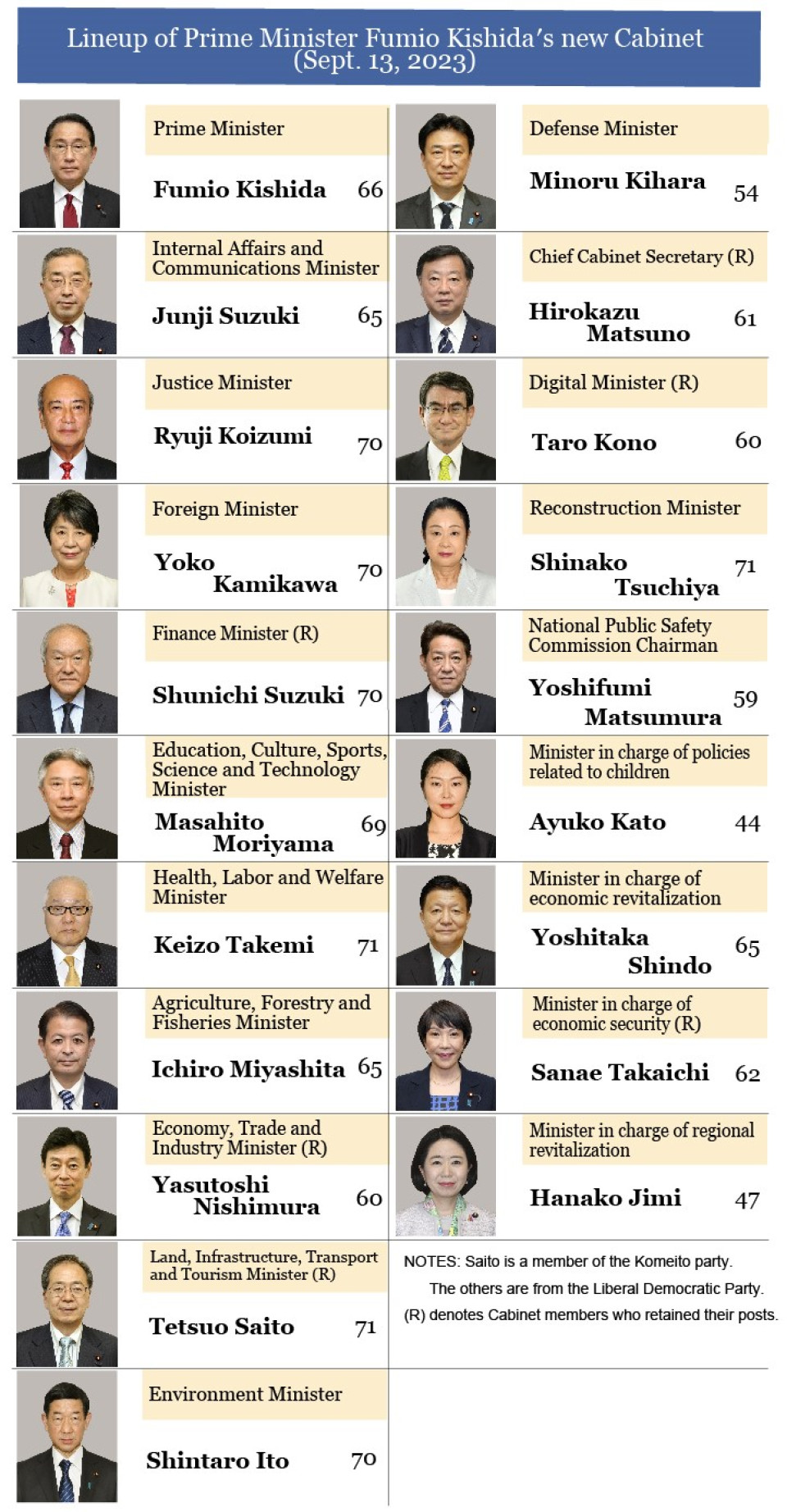Japanese Prime Minister Fumio Kishida's unimpressive Cabinet reshuffle is unlikely to boost his popularity, preventing him from dissolving the lower house for a snap election soon to solidify his political base, pundits said.
Also, a planned pump-priming economic package might not work as well as the government expects, while skepticism has been growing about whether his diplomatic ambition of holding a summit with North Korean leader Kim Jong Un will materialize.
Kishida has been eager to dissolve the House of Representatives as early as the end of this year, as he has been trying to bolster his political clout by winning the general election, aiming to be re-elected as president of the ruling Liberal Democratic Party.
But Kishida may face difficulties in determining the optimal timing for the lower house dissolution before the LDP presidential race scheduled for September 2024, as factors that could lead to the restoration of trust in his Cabinet are limited, the pundits said.

Although the next lower house election is not required to be convened until 2025, the prime minister possesses the constitutional authority to dissolve the chamber at any time and call for a general election, a significant element in Japan's political landscape.
Approval ratings for Kishida's government have remained low, largely attributed to problems with the My Number national identification card system, as well as public frustration over rising energy and daily necessities costs without corresponding wage increases.
With the ratings hovering just above 30 percent, widely regarded as a "danger level," Kishida sought to achieve positive diplomatic outcomes by attending summits with the Association of Southeast Asian Nations and the Group of 20 major economies earlier this month.
Specifically, Kishida endeavored to secure China's understanding regarding the safety of the discharge of treated radioactive water from the Fukushima nuclear plant into the sea, which began on Aug. 24. A catastrophic earthquake and tsunami crippled the plant in March 2011.
Kishida, however, was unable to persuade China, and during his week-long trip to Indonesia and India to join the ASEAN and G-20 summits, Sunday's announcement of his personnel reshuffle plan ended up drawing the most public attention.
After returning to Japan, Kishida revamped his Cabinet and the LDP executive lineup on Wednesday, a strategy that previous prime ministers have employed to rejuvenate the image of their governments when approval ratings started to drop.
However, this approach has also carried the risk of gaffes and scandals involving new ministers.
After Kishida revamped his team last summer, four Cabinet members resigned by the end of 2022 in the wake of revelations of dubious ties with a controversial religious group and political funds scandals, painting his government into a corner.
Reflecting on the past, Kishida retained key figures in both his Cabinet and the party, including LDP Secretary General Toshimitsu Motegi and Vice President Taro Aso, a former prime minister, with the aim of ensuring the stability of his administration.
The move could help the Cabinet avert risks, but Shinichi Nishikawa, a political science professor at Meiji University, said Kishida ultimately failed to convey "a sense of refreshment" to the public, leaving the impression that "nothing" has changed.
While the easiest way to raise public expectations for a new Cabinet is often thought to be the appointment of female or junior lawmakers to key posts, Nishikawa pointed out that it might be challenging for Kishida to identify individuals who are both "reliable" and qualified to serve as ministers.

Out of 19 ministers in his new Cabinet, Kishida has appointed a record five female ministers and 11 new faces unfamiliar to the public.
"The support rates may slightly increase after the Cabinet reshuffle, but the effect is set to be short-lived," he said.
In addition to the Cabinet reshuffle, Kishida has pledged to expand a subsidy program for oil wholesalers, designed to alleviate the negative impact of price hikes on households from September, in an apparent bid to regain public confidence in his government.
Takuma Ohamazaki, a political analyst operating the election consulting firm J.A.G. Japan, said the relief measure might be welcomed in rural areas, where most voters have cars, as well as farmers and fisheries, which rely heavily on gasoline for their businesses.
But in populous prefectures, such as Tokyo and Osaka, he said people who do not drive and consume gasoline daily would not have much reason to praise Kishida's decision.
Kishida is certain to hammer out another relief package, possibly in October, centering on curbing the rise in electricity and gas bills, and submit a draft supplementary budget to parliament for the fiscal year through March 2024 under the new Cabinet.
Ohamazaki also cast doubt on the effectiveness of the envisioned rescue plan in shoring up support rates for Kishida's Cabinet, saying, "As economic stimulus measures in the fall have become an annual event, their impact has weakened year by year."
Even if the reshuffle and the new economic policy thwart his efforts to maintain his government, Kishida may use North Korea, which has no diplomatic ties with Japan, as a last resort to prop up approval ratings for his Cabinet, some political experts said.
Kishida is believed to be paving the way for a summit with Kim to resolve the long-standing issue of Japanese nationals abducted by Pyongyang in the 1970s and 1980s, given that he promised in May to set up high-level bilateral negotiations with North Korea.
As Kishida's popularity rebounded after his surprise visit to Ukraine for talks with President Volodymyr Zelenskyy in March, he hopes to replicate the success by becoming the first Japanese leader to meet a North Korean leader in around two decades, the experts said.
Still, both Nishikawa and Ohamazaki questioned the feasibility of this strategy, stating that even if Kishida could engage in talks with Kim, he would need to achieve significant accomplishments, such as bringing back Japanese abductees, to experience an upturn in public support.
Related coverage:
Japan PM revamps Cabinet to bolster support amid election speculation

 By Satoshi Iizuka,
By Satoshi Iizuka,








